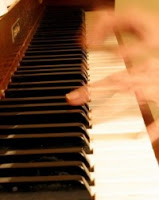En esta oportunidad te ofrecemos un nuevo ejercicio para que practiques la formación de oraciones condicionales del tercer tipo. Debes completar los espacios con la forma correcta del verbo que se encuentra entre paréntesis:
Archivo por años: 2008
Condicional Perfecto
El Condicional Perfecto es un tiempo verbal que se utiliza para describir situaciones que habrían sucedido, pero que por algún motivo no ocurrieron. Es decir, que puede utilizarse como equivalente en el pasado del Futuro Perfecto como vemos a continuación:
Para las 8 en punto, mi madre habrá preparado la cena.
(La oración está expresada en futuro perfecto haciendo referencia a una situación que se va a desarrollar en un tiempo posterior aunque la afirmación se ha realizado en el presente)
I thought that by 8 o’clock, my mother would have prepared dinner.
Yo pensé que para las 8 en punto, mi madre habría preparado la cena.
(Aquí la oración expresa una situación que se iba a desarrollar en el futuro, pero a partir de un momento ubicado en el pasado)
After the meeting, I will have received the letter.
Después de la reunión, yo habré recibido la carta.
(La oración está expresada en futuro perfecto haciendo referencia a una situación que se va a desarrollar en un tiempo posterior aunque la afirmación se ha realizado en el presente)
I supposed that after the meeting, I would have received the letter.
Yo supuse que después de la reunión, yo habría recibido la carta.
(Aquí la oración expresa una situación que se iba a desarrollar en el futuro, pero a partir de un momento ubicado en el pasado)
La forma afirmativa del Condicional Perfecto se obtiene colocando el sujeto seguido del Condicional Simple del verbo auxiliar TO HAVE, acompañado del verbo principal en Pasado Participio (regulares e irregulares) como vemos en el siguiente cuadro. Utilizamos el verbo pintarTO PAINT a modo de ejemplo:
| I would have painted | Yo habría pintado |
| You would have painted | Tú habrías pintado |
| He would have painted | Él habría pintado |
| She would have painted | Ella habría pintado |
| It would have painted | Él/Ella habría pintado |
| We would have painted | Nosotros habríamos pintado |
| You would have painted | Ustedes habrían pintado |
| They would have painted | Ellos habrían pintado |
La forma interrogativa se construye colocando en primer lugar el auxiliar WOULD, luego el sujeto, posteriormente la forma infinitiva del verbo auxiliar TO HAVE y finalmente el verbo principal en Pasado Participio (regulares e irregulares):
| Would I have painted? | Habría yo pintado? |
| Would you have painted? | Habrías tu pintado? |
| Would he have painted? | Habría él pintado? |
| Would she have painted? | Habría ella pintado? |
| Would it have painted? | Habría él/ella pintado? |
| Would we have painted? | Habríamos nosotros pintado? |
| Would you have painted? | Habrían ustedes pintado? |
| Would they have painted? | Habrían ellos pintado? |
La forma negativa la conseguiremos si colocamos la negación NOT entre el auxiliar WOULD y la forma infinitiva del verbo auxiliar TO HAVE y a continuación el verbo principal en Pasado Participio (regulares e irregulares). También aquí podemos utilizar la contracción WOULDN’T en lugar de WOULD NOT:
| I would not have painted | Yo no habría pintado |
| You would not have painted | Tú no habrías pintado |
| He would not have painted | Él no habría pintado |
| She would not have painted | Ella no habría pintado |
| It would not have painted | Él/Ella no habría pintado |
| We would not have painted | Nosotros no habríamos pintado |
| You would not have painted | Ustedes no habrían pintado |
| They would not have painted | Ellos no habrían pintado |
Oraciones Condicionales: Tercer Tipo
Luego de haber aprendido el primer y segundo caso de oraciones condicionales, finalmente llegamos al tercer tipo que sirve para expresar una situación del pasado, pero que ya no se puede cumplir de ninguna manera, por ejemplo:
Si yo hubiese entendido la lección, habría aprovado el exámen.
If he had found the key, he would have opened the door.
Si él hubiese encontrado la llave, habría abierto la puerta.
En ambos casos observamos que no existen posibilidades de que la condición se cumpla.
Estas oraciones se componen comenzando con IF, luego la condición en tiempo pasado perfecto seguido de la consecuencia en condicional perfecto, como vemos a continuación:
| IF | CONDICIÓN | CONSECUENCIA |
| Si | ella hubiese trabajado duro | habría ganado mucho dinero |
| If | she had worked hard | she would have won a lot of money |
| IF | HE HAD WON THE LOTO | HE WOULD HAVE BOUGHT A NEW CAR. |
| Si | él hubiese ganado el Loto | él habría comprado un nuevo coche. |
| IF | YOU HAD LOST THE BOOK | YOU WOULD HAVE BOUGHT A NEW ONE. |
| Si | tú hubieses perdido el libro | tú habrías comprado uno nuevo. |
| IF | YOU HAD INVITED ME TO THE CINEMA | I WOULD NOT HAVE ACCEPTED. |
| Si | tú me hubieses invitado al cine | yo no habría aceptado. |
Solución del ejercicio sobre Grados de los Adjetivos (2)
Aquí tienes las respuestas al ejercicio sobre grados de los adjetivos para que verifiques si lo has realizado correctamente:
Solución del ejercicio sobre Oraciones Condicionales de Segundo Tipo
Ejercicios: Oraciones Condicionales – Segundo Tipo
En el siguiente ejercicio podrás practicar el segundo tipo de oraciones condicionales. Para ello debes colocar el verbo que se encuentra entre paréntesis en la forma correcta:
Solución del ejercicio sobre Oraciones Condicionales de Primer Tipo
Estos son las soluciones al siguiente ejercicio sobre oraciones condicionales del primer tipo:
Solución del ejercicio sobre Oraciones Condicionales de Primer Tipo (3)
Aquí tienes la solución al ejercicio sobre oraciones condicionales de primer tipo que te hemos ofrecido con anterioridad:
Solución del ejercicio sobre Oraciones Condicionales de Segundo Tipo (3)
Ejercicios: Oraciones Condicionales – Segundo Tipo (3)
En esta oportunidad te ofrecemos un nuevo ejercicio para que practiques la formación de oraciones condicionales de segundo tipo. Debes completar los espacios con la forma correcta del verbo que se encuentra entre paréntesis:












